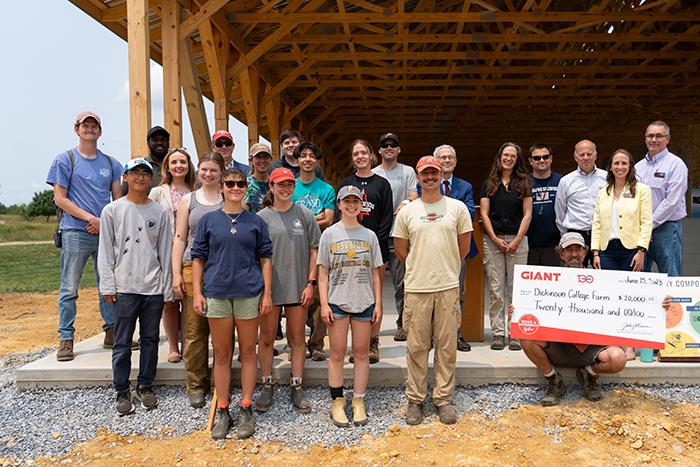Dickinson's Farm Receives $20,000 Grant for Waste-to-Energy Project

Students, professors, administrators and farm staff are joined by leaders from the GIANT Company and Keep Pennsylvania Beautiful at the site of the new anaerobic digester. Photo by Dan Loh.
Funding is part of community-improvement grants from the Giant Company and Keep Pennsylvania Beautiful
by Craig Layne
The Dickinson College Farm has received a $20,000 grant to support the construction of its anaerobic digester project, which will convert food waste and manure into energy. The digester, currently under construction at the farm, served as the backdrop for the GIANT Company and Keep Pennsylvania Beautiful to announce their 2023 Healing the Planet community improvement grants. The Dickinson digester is one of 23 grant-winning projects that address food waste prevention, reduction and recovery.
"We are grateful to the GIANT Company and Keep Pennsylvania Beautiful for their support of our food waste-to-energy initiative,” says Matt Steiman, the farm's energy & livestock manager. “This project will benefit farmers, the watershed and our climate. We are elated and look forward to working with these local partners to make our community more sustainable.”
The anaerobic digester takes food waste and manure and turns it into biogas, which can be used for cooking, heating and generating electricity. Dickinson has been diverting food waste from landfills to the farm since 2008, when the college launched a composting project with scraps from the dining hall. Alongside the compost program, the farm began experimenting with small-scale biogas digesters more than a decade ago. This work ramped up in 2020 with the initiation of the farm-scale digester project, in partnership with neighboring Triple L Farm.
Steiman says the new digester will process the manure from the neighbor’s 150 dairy cows plus two tons of food waste every day. That food waste will come not only from the Dickinson dining hall but also from local restaurants and other partners, including spent brewer’s grain from the Molly Pitcher Brewing Company. The gas will then generate about 200,000 to 300,000 kWh per year of renewable electricity. The farm can use that electricity to power its operations and sell some back to the grid.
“This project will serve as a model for midsize dairy farms in our region and across the country,” Steiman says. “This digester is going to be a working, teaching and research asset. We’ll collect and share production data and will invite other farmers and school groups to visit the facility. We’re also excited to continue our collaborative work with Dickinson students and professors to study science and engineering aspects of the biogas production process.”
The farm is seeking additional community partners for food waste diversion. Cumberland Valley institutions and businesses that would like to recycle their food waste are encouraged to email farm@dickinson.edu to connect.
Dickinson’s commitment to sustainability and the farm’s reputation for innovation have already helped secure more than $1 million in prior funding for the digester, which has come from the USDA Natural Resource Conservation Service, the U.S. Environmental Protection Agency, the Met-Ed Sustainable Energy Fund, Constellation Energy, the Pennsylvania Department of Agriculture, the Pennsylvania Department of Environmental Protection, High Tide Foundation, Cumberland County Conservation District and the South Mountain Partnership.
TAKE THE NEXT STEPS
Published June 28, 2023